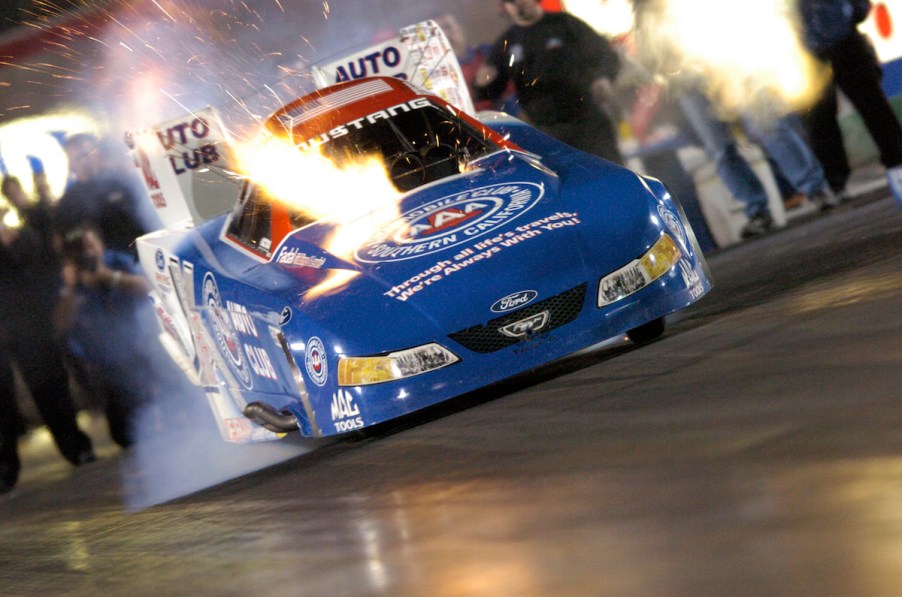
What Causes a Car to Backfire and How to Fix It
Gasoline-fueled internal combustion engines power most vehicles on the road today. Those engines use gas that ignites when introduced to a spark. So if a car backfires, something is wrong somewhere in the system. Learn more about why cars backfire and how to fix the problem.
What causes a car to backfire?

According to Family Handyman, there are several reasons your car could backfire, including the following:
- Air filter
- Air/fuel mixture
- Engine timing
- Fuel injectors
- Ignition system
Let’s dive into this list to learn more.
Air filter
Checking the air filter at the first sign of a backfire is easy. Checking your owner’s manual or searching YouTube for the year and model of your car can help you locate and remove your air filter. For example, entering “2021 Mazda CX-5 air filter” in YouTube’s search bar returns a few videos on the subject.
Start by inspecting the air filter unless you believe it is due for replacement based on your car’s maintenance schedule. If the air filter looks clean and the compartment that houses it is free of debris, put it back in place.
Air/fuel mixture
Diagnosing your car’s air/fuel mixture ratio is not an easy DIY task. Some common causes of an imbalance include one or several faulty sensors, oxygen, mass air flow, engine air intake, coolant temperature, manifold pressure, and throttle position. Other causes could be a bad exhaust gas recirculation (EGR) valve or a vacuum leak somewhere in the tubing around the engine compartment.
Even if you prefer DIY solutions, taking the car to a professional for diagnostics will save you time and frustration in the long run.
Engine timing
Internal combustion gasoline engines rely on a precisely timed spark to ignite the air/fuel mixture at the correct time during the combustion cycle. If the spark occurs too early or too late, the unburned mixture escapes into the car’s exhaust system and could ignite when it enters the catalytic converter.
This ignition results in a loud pop or bang similar to a gunshot we associate with a backfire. Common causes include a faulty camshaft, crankshaft, throttle position, and knock sensors. Loose or worn timing chains or belts also lead to mistimed ignition sequences.
Fuel injectors
Fuel injectors regulate the fuel supplied to the fuel/air mixture. Some issues causing improper fuel injector operations are a defective fuel pump, clogged fuel system, faulty fuel regulator, dirty fuel filter, and fuel injectors.
Though most of this list requires professional tools and knowledge, changing the fuel filter and adding fuel injector cleaner to your gas tank could provide results.
Ignition system
Modern cars no longer employ the old distributor caps, spark plug wires, and single-coil ignition systems of older vehicles. Instead, today a computer regulates spark control to a coil firing each spark plug. Unfortunately, coils and spark plugs can fail, and replacing old spark plugs is almost always an easy DIY task.
However, coils are expensive and typically do not all fail at one time, so a professional diagnosis might be in order.
Can backfires damage the car’s engine?
A backfire could be the first sign your car needs maintenance or repairs. Typically, a single backfire won’t damage your car’s engine, but repeated backfires could harm your exhaust system, including expensive catalytic converters.
Also, ignoring backfires means ignoring the cause, which could send your car into “limp mode,” reducing power to prevent damage to the drivetrain.
How do you stop a car from backfiring?
Performing regular maintenance as suggested in your vehicle’s owner’s manual is a great way to limit the likelihood of backfire. However, even with proper care, problems can arise.
Once you’ve completed all of the steps you’re comfortable performing, it’s time to visit a trusted mechanic with the necessary diagnostic equipment and tools to stop your car from backfiring.



